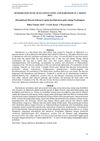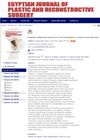 January 2022 in “Plastic and Aesthetic Research”
January 2022 in “Plastic and Aesthetic Research” Choose the simplest, most fitting scalp reconstruction method for each patient's unique needs.
April 2021 in “Aktuelle Dermatologie” Frontal Fibrosing Alopecia is a type of hair loss that mainly affects postmenopausal women, has unclear causes, and lacks evidence-based treatments.
 July 2020 in “Hair transplant forum international”
July 2020 in “Hair transplant forum international” Nitroglycerin can stop scalp necrosis during hair transplant surgery.

Scalp cooling is recommended to prevent chemotherapy-induced hair loss, but no effective drugs are available.
 August 2013 in “Fertility and Sterility”
August 2013 in “Fertility and Sterility” Hair loss is common in women with PCOS and is linked to symptoms like acne and excess hair but not to worse metabolic health.
 April 2005 in “AORN Journal”
April 2005 in “AORN Journal” The book is a detailed guide on dermatologic surgery techniques, recommended for both new and experienced doctors.
December 2002 in “대한피부과학회지” Higher androgen receptor levels in bald areas may cause hair loss, while estrogen receptors have less impact.
February 2023 in “Current Pharmaceutical Design” Natural remedies like certain plants can help reduce hair loss and promote hair growth.
 June 2023 in “JAAD Case Reports”
June 2023 in “JAAD Case Reports” A man had a rare skin cancer that looked like a bald spot.
 33 citations,
February 1999 in “The journal of investigative dermatology/Journal of investigative dermatology”
33 citations,
February 1999 in “The journal of investigative dermatology/Journal of investigative dermatology” IGF-1 increases whisker growth in transgenic mice.
 November 2023 in “Jurnal Ilmu Kesehatan Hewan”
November 2023 in “Jurnal Ilmu Kesehatan Hewan” The dog's condition improved after 21 days of treatment.
30 citations,
November 2015 in “Advanced Pharmaceutical Bulletin” Nanoethosomes can improve the skin penetration of Lidocaine for topical use.
 4 citations,
January 2022 in “Sustainable development goals series (Print)”
4 citations,
January 2022 in “Sustainable development goals series (Print)” Combining new technologies and practices can improve food systems to meet global sustainability goals.
 54 citations,
December 2007 in “Best Practice & Research Clinical Endocrinology & Metabolism”
54 citations,
December 2007 in “Best Practice & Research Clinical Endocrinology & Metabolism” Targeting glucocorticoid action might help treat type-2 diabetes, but human trials are needed.
 34 citations,
December 2012 in “Indian Journal of Dermatology, Venereology and Leprology”
34 citations,
December 2012 in “Indian Journal of Dermatology, Venereology and Leprology” Mesotherapy shows promise for cellulite and facial rejuvenation but has mixed results for body sculpting and hair loss, with more research needed for safety and effectiveness.
 28 citations,
January 2011 in “Hearing Research”
28 citations,
January 2011 in “Hearing Research” Gene therapy, especially using atoh1, shows promise for creating functional sensory hair cells in the inner ear, but dosing and side effects need to be managed for clinical application.
 20 citations,
August 2019 in “Journal of Cosmetic Dermatology”
20 citations,
August 2019 in “Journal of Cosmetic Dermatology” Mesotherapy is generally safe but can cause adverse reactions due to its varied use and lack of standardization; individualized treatment is needed for these complications.
 9 citations,
May 2005 in “Annales de dermatologie et de vénéréologie”
9 citations,
May 2005 in “Annales de dermatologie et de vénéréologie” Oral zinc and topical steroids can effectively treat chronic scalp pustules and hair loss in elderly patients.
 5 citations,
December 2011 in “Drug Research”
5 citations,
December 2011 in “Drug Research” CB-03-01 is a promising skin cream for treating hormone-related skin problems without causing harmful body-wide effects.
4 citations,
December 2021 in “Dermatologic Therapy” Mesotherapy for hair loss can cause temporary forehead swelling.
 July 2022 in “The Egyptian Journal of Plastic and Reconstructive Surgery”
July 2022 in “The Egyptian Journal of Plastic and Reconstructive Surgery” Using Platelet Rich Plasma with hair transplants is effective for treating hair loss due to burns.
December 2011 in “The American Journal of Cosmetic Surgery” The brow-suspension suture is a quick, safe, and effective alternative to traditional brow lifts.
 June 2002 in “International Journal of Cosmetic Surgery and Aesthetic Dermatology”
June 2002 in “International Journal of Cosmetic Surgery and Aesthetic Dermatology” The document recommends several books on cosmetic surgery and complementary medicine, highlighting their detailed methods, multidisciplinary approaches, and valuable treatment insights.
 211 citations,
May 2018 in “Trends in cell biology”
211 citations,
May 2018 in “Trends in cell biology” Different types of skin cells play specific roles in development, healing, and cancer.
 192 citations,
March 2017 in “Cell host & microbe”
192 citations,
March 2017 in “Cell host & microbe” Hair follicle development and microbes help regulatory T cells gather in newborn skin.
 82 citations,
January 2000 in “Hormone Research in Paediatrics”
82 citations,
January 2000 in “Hormone Research in Paediatrics” DHEA stimulates skin oil glands and could help postmenopausal women, with potential for acne and excessive hair growth treatments.
 81 citations,
July 2008 in “The Journal of Clinical Endocrinology and Metabolism”
81 citations,
July 2008 in “The Journal of Clinical Endocrinology and Metabolism” Certain mutations in the H6PD gene cause Cortisone Reductase Deficiency by affecting hormone production.
61 citations,
April 2018 in “Frontiers in endocrinology” Sex steroids produced in the hippocampus are crucial for brain functions like memory and learning in rodents.
48 citations,
March 2005 in “PubMed” Some plant-based compounds might help control the growth of new blood vessels if further research confirms their effectiveness.
 45 citations,
April 2018 in “Nature Reviews Urology”
45 citations,
April 2018 in “Nature Reviews Urology” Male genital development is driven by androgen signaling and understanding it could help address congenital anomalies.






















